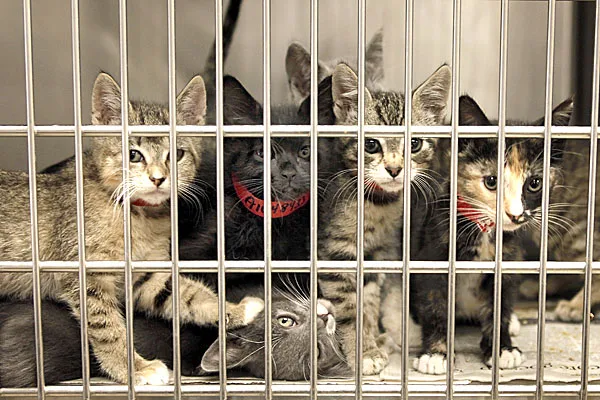In an email to me, Nathan Winograd, "The voice of America's displaced pets and the conscience of the animal sheltering industry" tells me that in a number of American communities they place over 95%, and as high as 99%, of rescue animals in their care at shelters. He says that they are following his no-kill policies and he has consistently said that it is possible to genuinely place far more animals than is currently the case in many shelters through good management and a progressive and imaginative approach to saving lives through increasing adoptions. This is my interpretation.
 |
| Shelter cats needing a quality home. Image in public domain. |
He quotes three successful communities:
• Gunnison County, CO, reported a 99% placement rate for dogs, 98% for cats, and 100% for other small animals.
• Flat Rock, MI, reported a 97% placement rate for dogs and 99% for cats.
• Shiawassee County, MI, reported a 97% placement rate for dogs, 99% for cats, and 100% for other animals
He says that these communities prove that animals are not dying in pounds because there are too many rescue animals or too few homes in which to place them, or that people don't want the animals. He said that they are dying in many pounds because people are killing them. What he is saying is that when the focus is on euthanasia of shelter animals (a euphemism for killing) rather than on how to rehome them and a commitment to that second objective, you end up with a higher death rate.
He calls it his "No Kill Equation". He has an enemy in PETA. PETA claim that his thoughts are misplaced. PETA prefer to euthanise animal shelters as a means of dealing with them if there are too many as it is the humane way under tough circumstances.
And they say that there are too many cats and too many killings at shelters because of bad cat management i.e. through informal breeding and carelessness et cetera. The problem is with people and their ownership of cats not with the volunteers and workers at shelters who are doing sterling work.
And they also say that if a shelter tries to implement Nathan Winograd's 'No Kill Equation' they can end up with big issues and problems. One problem that they seem to point out is that sometime shelters, in an effort to stop euthanising animals, stop taking them in and push the problem back on the general public which can lead to animal cruelty outside of the shelter. They provide examples of that. For example:
"A Virginia woman who was convicted of cruelty to animals in the shooting deaths of six puppies testified that “she was angry and frustrated that even though she tried to do the right thing, she wasn’t able to find a place for the animals.” She reportedly contacted two shelters, but one was full and the other wouldn’t take the puppies because they belonged to her son. The woman said that she then shot them to death and disposed of their bodies."
If that is true then the shelters it seems to me are not implementing Nathan Winograd's policies. I don't think his policies suggest that shelters should reject incoming cats and dogs. I think what he wants people to do is to use more progressive methods to rehome them and focus on that.
Arguably, it is PETA who have misplaced thoughts in this regard. It is possible - and I'm not sure - that PETA don't fully understand Nathan Winograd's no-kill policies. And that may be because he doesn't explain them clearly enough. And perhaps his policies demand a rigour and commitment in shelter workers which is perhaps beyond their capabilities.
Although I am an admirer of Nathan Winograd, I think one problem that he has is communicating through the written word. He is a lawyer and therefore a great legal communicator but his language is tangled up in complexity. I don't think he writes in a clear and concise way which would help to get his message across to the general public at large i.e. to everybody. This I feel is a failing and something which holds him back.



No comments:
Post a Comment
Your comments are always welcome.
Note: only a member of this blog may post a comment.